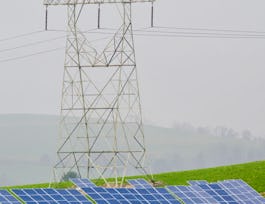This course supplies learners with the insights necessary for properly planning, and therefore successfully installing, a photovoltaic (PV) system per design specifications. It directs learners through the important steps of initial site inspection and evaluating appropriate locations for PV systems, and features unique elements of residential, small, industrial and utility-scale solar applications. The course probes key design concerns – including load, efficiency, and mechanical and electrical design – as well as aesthetics and tools for planning. Learners experiment with calculations needed to design a PV system, exercising newly gained knowledge about site selection, layout, code compliance, system components, and wire sizing.


Solar Energy and Electrical System Design
This course is part of Solar Energy for Engineers, Architects and Code Inspectors Specialization
Taught in English
Some content may not be translated

Instructor: Gay E Canough
21,126 already enrolled
Included with 
Course
(657 reviews)
95%
What you'll learn
Analyze advantages and disadvantages of various PV systems
Evaluate PV system requirements
Identify key PV design considerations and planning tools
Details to know

Add to your LinkedIn profile
11 quizzes
Course
(657 reviews)
95%
See how employees at top companies are mastering in-demand skills

Build your subject-matter expertise
- Learn new concepts from industry experts
- Gain a foundational understanding of a subject or tool
- Develop job-relevant skills with hands-on projects
- Earn a shareable career certificate


Earn a career certificate
Add this credential to your LinkedIn profile, resume, or CV
Share it on social media and in your performance review

There are 5 modules in this course
Learners will explore site inspection considerations, shade calculations, roof assessments, solar panel location and spacing, floodplains, power line and battery locations, circuit boxes, pros and cons of rooftop and ground-mounted systems, and considerations related to commercial and utility scale solar applications.
What's included
11 videos9 readings3 quizzes
Students will learn about system loads and efficiency, wind and weight loading, how to calculate the proper size for lag bolts, measuring excess capacity, and considerations related to ballast systems.
What's included
7 videos6 readings2 quizzes
Students will learn about system sizing considerations and calculations.
What's included
14 videos14 readings3 quizzes
Students will learn about aesthetics considerations and tools for PV planning
What's included
4 videos7 readings2 quizzes
Students will apply their learning to perform system design calculations.
What's included
1 reading1 quiz
Instructor

Offered by
Recommended if you're interested in Environmental Science and Sustainability

University at Buffalo

The State University of New York

University at Buffalo

University at Buffalo
Why people choose Coursera for their career




Learner reviews
Showing 3 of 657
657 reviews
- 5 stars
75.49%
- 4 stars
21.30%
- 3 stars
2.28%
- 2 stars
0.30%
- 1 star
0.60%

Open new doors with Coursera Plus
Unlimited access to 7,000+ world-class courses, hands-on projects, and job-ready certificate programs - all included in your subscription
Advance your career with an online degree
Earn a degree from world-class universities - 100% online
Join over 3,400 global companies that choose Coursera for Business
Upskill your employees to excel in the digital economy
Frequently asked questions
Access to lectures and assignments depends on your type of enrollment. If you take a course in audit mode, you will be able to see most course materials for free. To access graded assignments and to earn a Certificate, you will need to purchase the Certificate experience, during or after your audit. If you don't see the audit option:
The course may not offer an audit option. You can try a Free Trial instead, or apply for Financial Aid.
The course may offer 'Full Course, No Certificate' instead. This option lets you see all course materials, submit required assessments, and get a final grade. This also means that you will not be able to purchase a Certificate experience.
When you enroll in the course, you get access to all of the courses in the Specialization, and you earn a certificate when you complete the work. Your electronic Certificate will be added to your Accomplishments page - from there, you can print your Certificate or add it to your LinkedIn profile. If you only want to read and view the course content, you can audit the course for free.
If you subscribed, you get a 7-day free trial during which you can cancel at no penalty. After that, we don’t give refunds, but you can cancel your subscription at any time. See our full refund policy.

